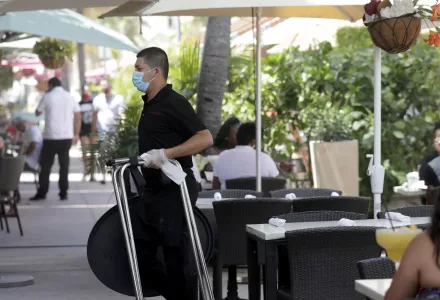
Our weekly COVID-19 and Economic Diplomacy tracker looks at policies that impact the coordination of international governments and central banks, ongoing commentary and analysis, and asks what these turbulent times mean for economic diplomacy.
We’d love to hear what you think. Send us your comments, and be sure to follow us on Twitter @BelferEDI.
The Highlights
- China has returned to growth, reporting a 3.2% increase in GDP in Q2, and avoiding a technical recession (two quarters of consecutive negative growth). Risks remain, including low consumer confidence and escalating tensions with the U.S. over Hong Kong.
- Allowing unemployment insurance to expire would reduce GDP by 2.5% on average in the second half of the year, costing an average of 2 million jobs over the next year and raising the unemployment rate by up to 1.2 percentage points, according to expert Jason Furman. Experts argue that the U.S. must tie unemployment benefits to the unemployment rate while investing in job training to restore jobs.
- The effects of the Covid-19 pandemic are disproportionate based on gender, race, and education. Women’s jobs are 1.8 times as likely to be cut in the recession than jobs held by men. In the U.S., the unemployment rate for Hispanic workers rose to 18.9 percent and hit 16.7% for Black workers. For those with only a high school diploma, unemployment rose 13.7 percentage points compared to 6.5 percentage points for those with a four-year college degree.
- Europe begins negotiations for a €750 bn recovery fund, as France allocates an additional €100bn for recovery efforts and the UK’s watchdog estimates £60bn increase in taxes to finance the stimulus.
Global Developments
The WHO conducts an internal audit on its response to the COVID-19 pandemic. With countries attempting to reopen their economies, some experts have begun exploring how to wind down fiscal policy which has allowed central banks to expand their role.
- As the Trump administration announced its plans to withdraw from the World Health Organization (WHO), the Financial Times analyzes how politics, science, and funding have weakened the public health institution. The COVID-19 crisis has only exacerbated the organization’s weaknesses resulting in an independent review on how the WHO handled the crisis.
- The Economist explores whether it is time to shift fiscal policy away from emergency stimulus measures. Household incomes in the U.S. were 12% higher this April relative to last year despite soaring unemployment, due to more generous unemployment benefits and direct stimulus payments. Poverty rates in the U.S. are also down. The publication argues that continuing stimulus efforts is too costly and may be propping up industries that have experienced structural shifts in demand. Another Economist article argues that attempts to boost the economy will have little to no effect without consumer confidence.
U.S. Developments
The Fed warns of potential market volatility while the largest three banks set aside $28bn for current and future loan losses. Many experts agree that unemployment benefits tied to the unemployment rate is vital for job restoration.
- Economists, business leaders, and labor experts agree that the U.S. needs to invest in building a more skilled workforce through training programs - “a Marshall Plan for ourselves.” The pandemic presents an opportunity to invest in job training and “‘help low-wage workers move into the middle skills and give them the skills to thrive.’”
- Randal Quarles, the Fed’s top bank regulator and chair of the global Financial Stability Board, warned that market volatility may return with a sharp drop in asset prices. In the Financial Stability Board’s letter to G20 Finance Ministers and Central Bank Governors, it also highlighted a number of vulnerabilities in the global financial system including the rapid downgrading of corporate debt and vulnerable offshore dollar funding markets.
- Wells Fargo, JPMorgan Chase, and Citigroup set aside a combined $28bn for current and future loan losses. Net income across the three banks hit the lowest level since the financial crisis, and loan loss charges exceeded those during the 2008 financial crisis.
- Jason Furman, a Harvard Kennedy School professor, writes that U.S. unemployment is driven by a lack of employer demand, not an unwillingness to work. As a result, he argues that expanded unemployment insurance should continue in light of the pandemic and the amount adjusted according to the unemployment rate.
- A series of Brookings reports explore the long-lasting economic consequences of the pandemic. Betsey Stevenson analyzes the impact of the COVID-19 recession on the labor market, with disproportionate effects based on gender, education, and race. David Autor and Elisabeth Reynolds make four projections about a rapidly automating post-pandemic economy which will have significant, negative consequences for low wage workers and economic inequality. Nancy Rose predicts products and labor markets may be less competitive and productive after COVID-19.
- Ben Bernanke, former chairman of the Fed, writes an op-ed for the New York Times that Congress must respond to the pandemic, and not leave decisions only to local and state governments. States and localities need additional federal intervention before CARES Act funding expires.
- Ishaan Tharoor writes for the Washington Post that the pandemic signals the beginning of the “Asian Century.” He argues that western democracies’ lack of capacity stems from post-Cold War hubris. In addition to the Asia-Pacific’s coronavirus response, there is a recognition globally of the importance of the region geopolitically as evidenced by recent strategic competition between the U.S. and China.
European Developments
As Europe begins discussions over a €750 bn recovery fund, France and the UK announce plans to boost their economies and restore public finance stability. Spain seeks €80 bn from the fund while Dutch prime minister Mark Rutte argues against its creation.
- French President Emmanuel Macron promised an additional €100 bn to the already €460 bn allocated to finance the country’s economic recovery. One of his goals during his presidency has been economic reform to liberalize the job market, create jobs, and attract international investors. He noted that France would face a surge in unemployment due to the pandemic.
- The Office for Budget Responsibility, the UK’s fiscal watchdog, stated that an increase in taxes totaling £60bn or a return to austerity was needed to restore public finance stability after the pandemic. Government borrowing as a result of the health crisis and the government’s decision to limit immigration after Brexit require the need for tax increases.
- Spain seeks €80bn from the EU recovery fund to boost employment. Spain is likely to suffer more unemployment than any other OECD member state, apart from South Africa. A quarter of the workforce could soon be unemployed as the country has yet to fully recover from the financial crisis a decade ago.
- Eurozone banks plan to cut business lending as they anticipate governments winding down their loan guarantee schemes.The combination of governments guaranteeing hundreds of billions of euros in loans to business and central banks providing ultra-cheap loans at negative rates have fueled demand for business loans in the Eurozone.
- The Financial Times Editorial Board calls for the Frugal Four - Netherlands, Sweden, Austria, and Denmark - to support the EU recovery fund as negotiations begin later this week. Mark Rutte, the Dutch prime minister, is the unofficial leader of the group and is against the fund, arguing that national governments, not the Commission, should decide whether a country receives aid payments. The board opines that Rutte’s opposition is “profoundly undemocratic” and only harms visions of a stronger Europe. Jules Muis, former Director-General and Internal Auditor at the European Commission responded to the editorial board arguing that Rutte is well within his right to insist on accountability instead of banking on trust.
Emerging Markets
- China has returned to growth, reporting a 3.2 percent increase in GDP in Q2. However, a major risk is escalating tensions between the U.S. and China. Earlier this week President Trump signed legislation that requires sanctions against Chinese officials and entities materially contributing to the erosion of Hong Kong’s autonomy, and financial institutions doing business with those on the sanctioned list.
- As Brazil struggles to respond to the COVID-19 crisis, disinformation and fake news adds to the crisis. According to a non-profit group, 9 in every 10 Brazilins have been exposed to fake news; 7 in 10 believed the disinformation. Brazil’s Congress is putting forth legislation to combat disinformation, forcing social media groups to ban fake accounts and those controlled by malicious bots, keep a database of metadata, and ensure racist content is immediately deleted.
- As Costa Rica seeks a $2.25bn IMF bailout to curb its debt, President Carlos Alvarado announced drastic spending cuts. The largest cut in Costa Rica’s history, it will amount to 1.3 percent of the country’s GDP. It will prove difficult for Alvardo’s budget to pass congressional approval. The larger problem, however, is the country’s aversion to revenue-raising measures.
- Vladimir Putin has delayed his $360bn National Projects investment plan, as the Russian economy falls into recession. Putin’s primary domestic policy initiative, the national investment project aimed to lift living standards and drive GDP growth to exceed the global average by 2024. The six-year delay of the plan is the latest sign that the pandemic is wreaking havoc on the economy.
- Central Asian countries have reintroduced lockdowns in response to a new surge in coronavirus cases. As the countries reopened, infections grew, placing enormous strain on the healthcare system and economic activity. The World Bank expects Kazakhstan's GDP to contract by 3 percent and Kyrgyzstan’s by 4 percent.
Odds and Ends
- Melinda Gates writes in Foreign Affairs that the pandemic and its larger impacts threaten to disproportionately affect women’s lives and livelihoods.
- In the Financial Times, Gillian Tett explores the increase in cyber crime during the pandemic. While state-sponsored cyber attacks have caught headlines, the larger trend is the explosion of attacks on business and individuals. This trend highlights the problem of extreme information asymmetry, wherein people rely heavily on processes that only a select few experts actually understand. The recent Twitter hack of prominent individuals’ accounts asking people to send bitcoin and Russian hackers trying to steal COVID-19 vaccine research are evidence of the uptick in cybercrime.
Suh, Hannah. “The Week in COVID-19 and Economic Diplomacy: 'Uneven Economic Response'.” July 16, 2020


